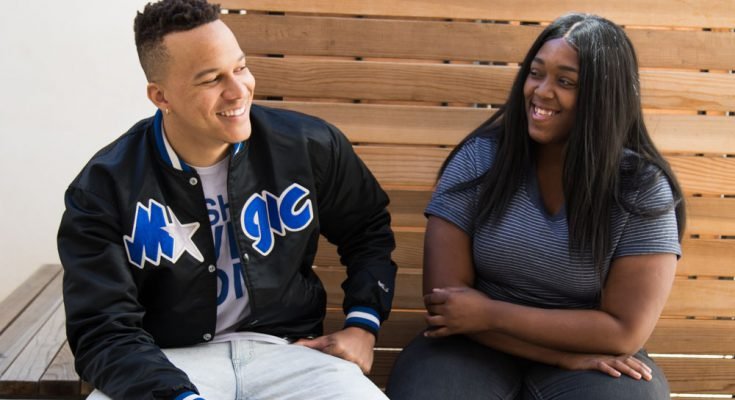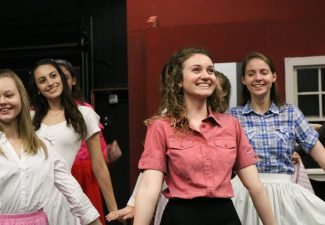“I don’t need a title to mean something. I don’t need a position to be great,” said Blake Andrews, former candidate for SGA vice president.
When Andrews and his running mate Maranda Idoni first announced their campaign slogan, it created quite a stir. Throughout campus, many students had their own interpretations to the saying, “we are the culture, and the culture speaks.”
Though the elections have passed, the former presidential duo has not given up on the meaning behind their campaign. The slogan, they say, was bigger than just their bid for SGA president and vice president. It was a hope to create positive change on campus, something they still hope to do.
“We are still going to continue our mission on this campus and even if it starts with just a few students that we can meet and if it just grows into something,” Idoni said.
As the elections approached, Andrews began to realize how Vanguard’s focus on community did not always see fruition, as many would talk but not do anything about it. He realized this through conversations with residents and knew that it was something that needed closer attention.
“People tend to exclude each other, so I thought it was about time as the culture of Vanguard to actually speak up and make changes,” he said.
A major focus on campus is having an atmosphere of love and community. Their campaign sought to make these expectations a reality for all students.
“I feel like that word [love] is tossed around a lot on this campus, and it’s more just like people speaking than actually showing it,” Andrews said.
Upon approaching students while considering their candidacy, Idoni and Andrews realized that many students felt overlooked on campus, despite the university’s efforts otherwise. For Idoni, she realized she too was guilty of talking to people but not engaging with them. She shared how easy it is to be comfortable with one’s friends and fail to reach beyond that.
“They weren’t feeling as though they mattered on the campus. And to me that was just shocking…And it took me internalizing that and realizing in myself that I get too busy and I’m always on the go and not being genuine and engaging with people when I talk to them,” she said.
It is easy to become comfortable in one’s environment, but that is not what we should strive to be as a campus, according to Idoni. Instead, there should be a desire for expansion.
“The word community is tossed around a lot too. Because it’s like yeah we have community but I know for myself…I have community with my certain group, and that’s not how we are made to be,” she said.
With this motivation in mind, the pair plans to keep the heart of the campaign alive as they interact with students in the future. As it turned out, there were many other students who wanted to take part. Idoni began to see even those who did not feel uninvolved wanted to engage in their effort.
“A lot of students were receptive. It wasn’t just the minority students or the students of color—they were of course receptive…because we knew where they were coming from and they knew where we were—but it was so great to talk to all these other students who didn’t understand but they wanted to. They didn’t completely understand but they were ready to listen,” she said.
And when it comes to community, Idoni and Andrews wanted it to be known that “the culture” speaks beyond minority students, and beyond their circle of friends and influence.
Not everyone interpreted the slogan as so welcoming and intended to touch every student’s experience at Vanguard. For Evangelia Osley, the informal campaign manager for the Idoni-Andrews effort, it was a shock to find some students had misinterpreted the slogan.
“After talking to one person, they said ‘I feel like they’re just going to do things for their culture,’ which means black people! And I was like really surprised that they thought that she meant black people,” Osley said.
Idoni ran into similar problems along the way, realizing some people assigned a different meaning than originally intended.
“A few students thought we were only talking to black students, or that we were just talking about Blake and I, or our friends,” she said.
According to Osley, this misunderstanding made Night of Speeches all the more important, because it gave the two a chance to clarify what they meant as their vision for campus. It was difficult for her to see over 300 people vote, but only 20 people come to hear the candidates’ speeches.
“Then it was like, oh my gosh, we need to explain this slogan so that people don’t think it’s about black people. So I was thinking when Night of Speeches comes, everyone is going to hear what they mean…and then no one came…It was like they had already made up their minds about what the slogan meant and who they were going to vote for,” Osley said.
Even though they were not elected, Idoni and Andrews hope the ideals that drove their campaign will show through in their life. They believe creating an atmosphere on campus that allows a conversation and welcomes people from all walks alike should not be a concept limited to the student body president.
“We don’t need that position. It was something that’s in our hearts…It was a complete passion of ours and it’s something that we can bring to any person in any walk of life. You can bring a genuine-ness and engagement with them,” Idoni said.

 Somali Terrorists Massacre 72 in the Kenyan Westgate Shopping Mall
Somali Terrorists Massacre 72 in the Kenyan Westgate Shopping Mall Is Space Travel Worth the Cost?
Is Space Travel Worth the Cost? How Fair is the Internet Radio Fairness Act
How Fair is the Internet Radio Fairness Act A week in the life of a theater student
A week in the life of a theater student
Leave a Reply